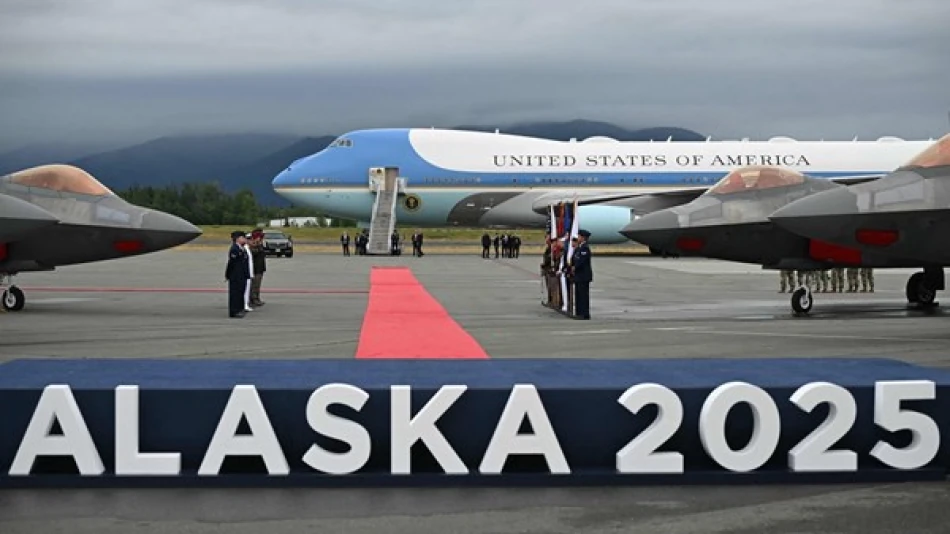
Trump Visits Alaska for High-Stakes Putin Summit: Diplomatic Showdown on the Arctic Frontier
Trump and Putin Set for High-Stakes Alaska Summit as Ukraine War Enters Critical Phase
President Donald Trump arrived at a military base in Alaska on Friday for a pivotal summit with Russian President Vladimir Putin, marking the Kremlin leader's first visit to Western territory since launching his invasion of Ukraine in February 2022. The meeting represents Trump's boldest diplomatic gambit yet to end the nearly three-year conflict that has reshaped global geopolitics and claimed hundreds of thousands of lives.
A Diplomatic Breakthrough or Strategic Miscalculation?
The choice of Alaska as a meeting venue carries symbolic weight—neutral American soil that avoids the optics of either leader traveling to the other's capital. Trump's willingness to engage Putin directly contrasts sharply with the previous administration's approach of isolating Moscow through sanctions and military aid to Ukraine.
Speaking to reporters aboard Air Force One, Trump acknowledged the uncertainty surrounding the summit's prospects. "I don't know what will make this meeting successful," he admitted, before emphasizing his primary objective: "I want certain things. I want a ceasefire. I want the killing to stop."
The President set an ambitious timeline, expressing hope for an immediate cessation of hostilities. "I want to see a quick ceasefire... I won't be happy if we don't achieve that today," Trump declared, while maintaining flexibility: "If the meeting with Putin doesn't go well, I'll walk away."
High-Level Diplomatic Architecture
Key Players at the Table
The summit's structure reflects the gravity of the negotiations. According to White House Press Secretary Caroline Levitt, Trump will be accompanied by Secretary of State Marco Rubio and Special Envoy Steve Witkoff. Dmitry Peskov, Putin's spokesman, confirmed that the two leaders would first meet privately before expanding discussions to include their respective delegations.
This format mirrors successful Cold War-era summits, where personal chemistry between leaders often proved as crucial as formal diplomatic protocols. The private session allows both presidents to gauge each other's red lines without the pressure of immediate public scrutiny.
Strategic Implications for Global Markets
Financial markets have been closely watching developments, with defense contractors' stocks fluctuating based on ceasefire speculation while energy futures remain volatile amid uncertainty over Russian oil and gas flows. A successful summit could trigger significant shifts in commodity markets, particularly if sanctions relief becomes part of any agreement.
European allies, meanwhile, face a delicate balancing act. While they share Trump's desire to end the bloodshed, many worry that premature negotiations could reward Putin's aggression and undermine the rules-based international order they've spent decades building.
Historical Precedent and Risks
Trump's direct engagement approach echoes Richard Nixon's opening to China and Ronald Reagan's summits with Mikhail Gorbachev—bold moves that initially faced criticism but ultimately reshaped geopolitics. However, the comparison has limits: Putin has shown little indication of the reformist tendencies that characterized Gorbachev's leadership.
The timing also presents challenges. With Russian forces having consolidated territorial gains in eastern Ukraine and Putin facing minimal domestic pressure to negotiate, Trump may find himself bargaining from a weaker position than anticipated during his campaign promises to end the war quickly.
The Stakes Beyond Ukraine
Success or failure in Alaska will likely define Trump's foreign policy legacy and America's global credibility. A breakthrough could position Trump as a master dealmaker capable of resolving intractable conflicts. Failure, however, might embolden other authoritarian leaders and raise questions about American diplomatic effectiveness.
For Putin, the summit represents an opportunity to break out of international isolation while potentially securing recognition of territorial gains. The Russian leader's calculation likely centers on whether Trump's eagerness for a quick resolution might lead to concessions that years of Western pressure couldn't extract.
As both leaders prepare for what could be the most consequential diplomatic encounter of the decade, the world watches to see whether personal diplomacy can succeed where traditional statecraft has struggled.
Most Viewed News

 Layla Al Mansoori
Layla Al Mansoori






